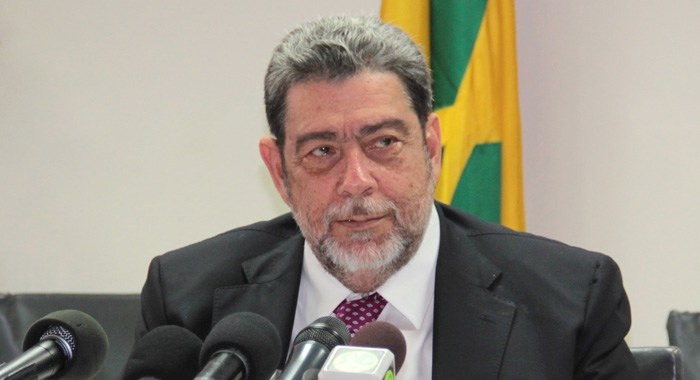Prime Minister Dr. Ralph Gonsalves is scheduled to host his first press conference for 2019 on Monday 6th January at 10 a.m at Cabinet Room.
The press conference between the passage of a number of bills in parliament close to the end of last year which are of critical importance to this country and especially to foreign business, and between the presentation of the budgetary exercise later this month.
It is anticipated that Vincentians will hear of the country’s latest fiscal position, the 2018 year having ended and projections for 2019, among other matters.
The IMF’s Staff Concluding Statement of the Article IV Mission on November 21, 2018, said that this country’s growth outlook was positive and
The continued growth is expected to be driven by increases in tourist arrivals, tourism-related activities (including investment in hotels and resorts), and related local production.
The Staff Concluding Statement projects that beyond 2020, growth will be sustained at around 2.3 percent, assuming steady tourism and investment growth. It says, however, that this outlook is subject to both external risks which include weaker-than-expected global growth, tighter global financial conditions, and higher oil prices; and domestic risks which include more severe and frequent natural disasters and the loss of correspondent banking relationships.
“There is also upside potential stemming from stronger-than-expected tourist arrivals, investor interest, concessional financing for capital projects, and the successful completion of the geothermal power plant,” the statement read.
The government has committed to bringing the debt-to-GDP ratio down to 60 percent by 2030.
The IMF Staff Concluding Statement said the 2019 budget should demonstrate the government’s commitment to fiscal consolidation, by maintaining the primary surplus at around 0.7 percent of GDP, slightly above the 0.6 percent of GDP (the mission’s estimate) in 2018.
“The mission recommends incorporating expected fiscal costs of natural disasters, equivalent to 1.4 percent of GDP a year (the average of the past 15 years), in the budget framework. This could be partly covered by the contingency fund and insurance payouts (in total, 0.7 percent of GDP), with the balance covered through allocating expenditure reserves for emergency operations…. Consideration should be given to expanding the coverage of disaster insurance, especially against floods to achieve additional buffers,” the IMF Staff Concluding Statement said.
The IMF Staff Concluding Statement said further that “fiscal risks remain, however, and “if growth momentum falters or natural disasters intensify, the 60 percent target would not likely be achievable by 2030.” It noted that the government also plans to launch several large developmental projects in the tourism and transport sectors to enhance growth, but this could widen the deficit if they are not accompanied by new fiscal consolidation measures.


1 Comment
getachiku1991_I am seeking a man >> http://ihot.ga